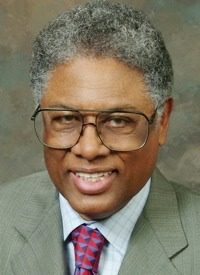
Wouldn’t it be better to live in a world where countries were not armed to the teeth, especially when they are armed with nuclear weapons? Of course it would.
But the only country we can disarm is our own. The only countries we might be able to persuade to disarm are countries that intend no harm in the first place. Those countries that do intend to harm others — and we know all too well that they exist — would be delighted to have all their victims disarmed.
What if we can just get nuclear disarmament?
Again, we need to think beyond the word to the realities of the world, so that we do not simply accept words as what Thomas Hobbes called the money of fools.
Had there been no nuclear weapons created during World War II, that would have given an overwhelming military advantage in the postwar world to countries with large and well equipped armies. Especially after the U.S. Army withdrew from Europe, following the end of World War II, there was nothing to stop Stalin’s army from marching right across the continent to the Atlantic Ocean.
The American troops that remained in Western Europe were not enough to stop the Soviet army. But they were enough that their slaughter by the Russians would have risked nuclear war with the United States.
Western Europe has had one of its longest periods of peace under the protection of the American nuclear umbrella. Japan, one of the biggest and most cruel conquerors of the 20th century, has become a peaceful nation after Hiroshima and Nagasaki.
In the real world, the question of whether nuclear disarmament is desirable or undesirable is utterly irrelevant because it is simply not possible, except in words– and we would truly be fools to accept such words at the risk of our lives.
Even if every nuclear weapon on the planet were destroyed — and how could we be sure that that had happened? — this would still not destroy the knowledge of how to make nuclear weapons.
Those countries with aggressive intentions towards other countries need only choose the time when they would put their knowledge of nuclear weapons to use, and have the world at their mercy.
Once they had nuclear weapons, they could threaten annihilation to any other nation that started to produce offsetting nuclear weapons.
Why then is President Barack Obama pursuing an international nuclear disarmament agreement? It cannot be because he thinks it will work. Even if he were foolish enough to believe that, virtually anybody in the Pentagon can tell him why it won’t.
His political advisors, however, can tell him how great that can be for him personally — if he doesn’t already know that. It would be “historic” and an “achievement,” just like ObamaCare.
His political base — the young, the left and the thoughtless — would be thrilled and energized. That can translate into money donated to his campaign coffers and people willing to walk the precincts to get out the vote for him in the 2012 elections.
It is by no means an irrational thing to do, from Obama’s self-centered perspective.
But what does it say about those who take his words literally, who accept those words as, in Thomas Hobbes’ words, the money of fools?
First of all, there may be more of such people today than in the past, as a result of the dumbing down of education and the politicizing of education at all levels with anti-nuclear propaganda, along with other propaganda of the left.
International disarmament has long been a favorite crusade of the left, before as well as after the age of nuclear weapons. The period between the two World Wars was full of popular disarmament agreements and renunciations of war.
In fact, such pious agreements contributed to the outbreak of war. Because some nations adhered to these agreements and others did not, the military advantage swung to the latter, who started the war — in which tens of millions of human beings died.
What a price to pay for accepting words as the money of fools.
This is part 4 of a multi-part series.
Click here to read part 1.
Click here to read part 2.
Click here to read part 3.
Thomas Sowell graduated magna cum laude from Harvard University (1958) and went on to receive his master’s in economics from Columbia University (1959) and a doctorate in economics from the University of Chicago (1968). He is the author of 28 books including his most recent, Intellectuals and Society. Currently he is a senior fellow at the Hoover Institution, Stanford University. His Web site is www.tsowell.com.
COPYRIGHT 2010 CREATORS.COM
Please contact your local newspaper editor if you want to see the Thomas Sowell column in your hometown paper.


